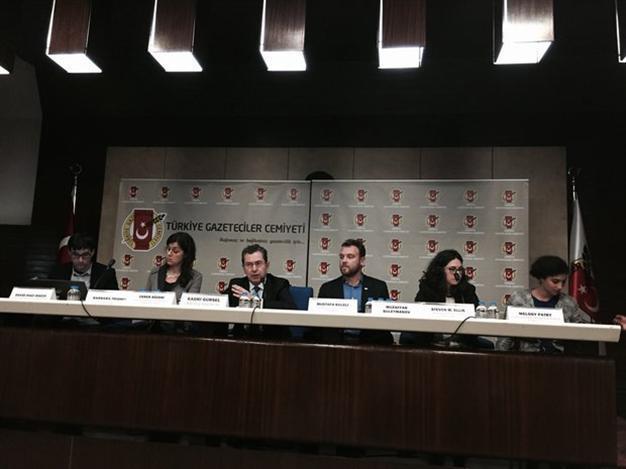Int’l press freedom coalition says pressure on media ‘severely escalated’ after June 7 polls
ISTANBUL
 A coalition of international free expression groups, which visited Turkey from Oct. 19 to Oct. 21 and met with local journalists and media outlets, has said that pressure on journalists operating in Turkey has “severely escalated” since the parliamentary elections on June 7.
A coalition of international free expression groups, which visited Turkey from Oct. 19 to Oct. 21 and met with local journalists and media outlets, has said that pressure on journalists operating in Turkey has “severely escalated” since the parliamentary elections on June 7.The joint international emergency press freedom mission to Turkey, which consisted of representatives from the International Press Institute (IPI), the Committee to Protect Journalists (CPJ), Reporters Without Borders (RSF), the International Federation of Journalists (IFJ), the European Federation of Journalists (EFJ), the Index on Censorship, Article 19 and the Ethical Journalism Network (EJN), said in a joint statement on Oct. 21 that pressure on media in Turkey has severely increased and also significantly impacted journalists’ ability to report on matters of public interest freely and independently since the June 7 election.
“This pressure, if allowed to continue, is likely to have a significant, negative impact on the ability of voters in Turkey to share and receive necessary information, with a corresponding effect on Turkey’s democracy,” read a part of the statement.
The representatives said they stood in solidarity with their colleagues in the Turkish media and demanded an immediate end to all pressure which hindered or prevented them from performing their job, or which served to foster an ongoing climate of self-censorship.
They urged for steps to be taken to ensure all journalists are able to freely investigate stories involving matters of public interest, including allegations of corruption, the Kurdish issue, alleged human rights violations, armed conflict - particularly issues related to the ongoing conflict in Syria - and local or regional issues or policies.
The mission representatives also urged Turkish President Recep Tayyip Erdoğan to “end all exercises of direct personal pressure on owners and/or chief editors of critical media, stop using negative or hostile rhetoric targeting journalists, accept the greater degree of criticism that comes with holding public office, stop using criminal ‘insult’ or ‘defamation’ provisions to silence critics and publicly call on supporters to refrain from seeking to initiate such cases on his behalf.”
The coalition urged foreign governments, particularly those of the United States and countries within the European Union, to press Turkey to uphold its commitments, respect and uphold international human rights standards and, in the case of the EU, ensure that any concessions granted in connection with the resolution of the ongoing refugee crisis are made consistent with a long-term strategy specifically designed to encourage Turkey to comply with its commitments to uphold international human rights standards.
They also urged journalists in Turkey to avoid the use of negative or hostile rhetoric targeting other journalists and to strive to uphold ethical standards developed by or as the result of self-regulatory bodies or processes, to exercise greater solidarity with colleagues under pressure and to defend the rights of all journalists.
















